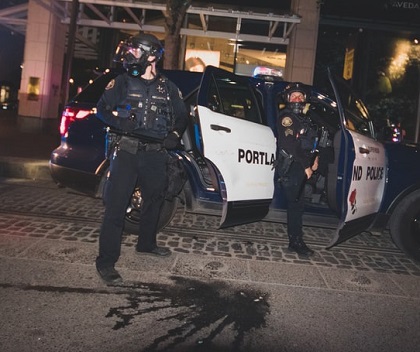Are we going to get what we want?
Oregon State Legislature is set to address police reform this week, in a closed to the public, special session.
Many new policies, currently being floated, are well supported by law enforcement, and have been requested through the chain of command for some time now. However, there's one policy that has many in law enforcement concerned, for several reasons. The idea is to hold each officer accountable, for excessive force, or causing injury to another when they take things too far. This, on the heels of the tragic death of George Floyd in Minneapolis. Many refer to this policy as "Qualified Immunity", but what is qualified immunity exactly?
Qualified Immunity pertains to officers, in the line of duty, who are required to make a split-second decision over life and death. The immunity aspect only pertains to officers who have followed police rules, regulations and policy to a T. It's determined as "qualified" when a police-involved fatality is, by the book, and therefore the officer is given immunity from liability for having carried out their job duties and description. When an officer uses unjustified force, the immunity is not applicable, and they are no longer protected or indemnified.
But what happens when officers can be held liable for their actions, even when they've followed all the rules? If immunity is removed, would every individual arrested and sent to jail, file a lawsuit against their arresting officer? Simply put, yes, if qualified immunity is completely removed, officers would have no protection for doing their job. How many good, qualified, well-educated individuals would want to stay on the job? My guess is, not very many. In the state of Oregon, finding good recruits has been difficult in the past few years, according to a state trooper who has asked to remain anonymous.
"I'm concerned that we'll be forced to hire whoever applies at this point, just to fill positions, as less qualified candidates will not want to be subjected to these working conditions," said one Oregon State Trooper.
Imagine if you will, working at McDonald's, and a customer becomes violently ill with e-coli food poisoning. Rather than sue the restaurant, the customer, instead, sues you directly. Most officers are not paid well enough to cover the cost of lawsuits. Several insurance agents, who have written policies for decades, were asked what they thought the cost might be per officer, if they needed to pay for insurance to do their job. While most were hesitant to guess, the result was a possible ballpark of around three thousand dollars per year. That's quite a chunk out of a salary, so let's just say the union renegotiates their contracts with the city or county to offset this cost. Who will ultimately pay for it? The taxpayers of course. That's potentially thousands more per year, for inferior law enforcement officers.
Luckily, our legislature is not quite there. However, the table is currently being set for this potential outcome.
LC 742 retroactively determines when an officer is liable for the use of acoustic devices, tear gas, and kinetic impact projectiles. This new law would only allow the use of non-lethal crowd control when the mayor, or sheriff declares an active riot, civil commotion or mob action. Oddly enough, the bill extends to proxy officers, like Federal Agents. The retroactive date is July 1st 2016, and states that incidents which have occurred prior to the passage of this bill (since July 1st 2016) have 180 days to submit their claim. Claims after passage have two years have to file a lawsuit. Two years seems like a very long time to determine if you've been hit by a projectile, if a riot was declared.
Perhaps our courts will be left to determine if a rally is indeed a riot, or a peaceful demonstration, after the fact? Either way this bill strictly states that officers will only be immune from liability if they're indemnified, which is redundant. Basically, our law is being left open to public pressure and perception, and our officers are on the hook depending upon the outcome. Ultimately, removing protections from officers in the line of duty, may cost the taxpayers more money, and result in less qualified officers.
One vital question arises when it comes to policy, "is the stated intent going to be the actual outcome?" If it's not, then why are we passing it? If you believe law enforcement should be protected and supported in doing their job, now is the time to email in your testimony. This bill, along with several others, was heard in the
Joint Interim Committee on Transparent Policing and Use of Force Reform.
--Breeauna Sagdal| Post Date: 2020-08-06 08:29:43 | |






